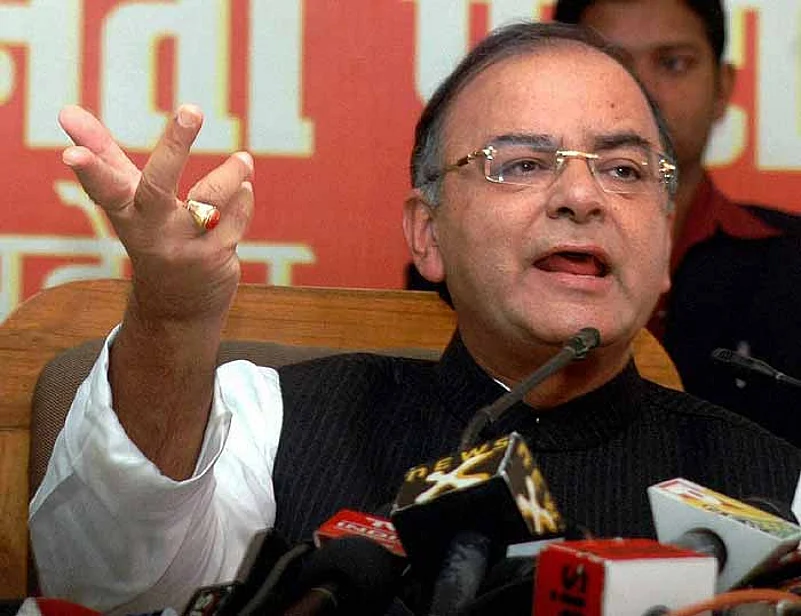Arun Jaitley is at the centre of most activities in the national BJP. He articulates policy, gives the spin to the media, devises political strategy, deals with allies like the JD(U) and Akali Dal, keeps the channels going with Narendra Modi, and is fire-fighter when crises (like the one in Karnataka) erupt. He has many critics and rivals but his legal background, cross-party connections, friends in the corporate world, all enhance his clout. He spoke to Saba Naqvi:
It is said that National parties are on the decline. We have just seen Congress doing very badly and BJP also has not done well.
It is inaccurate to suggest that the national parties are on the decline. For decades, Indian politics was dominated by the Congress Party. The BJP, in the last 20 years, has emerged as the alternative pole. The hard reality is that India today does not have a two-party system. Indian politics is dominated by two principal alliances— the UPA and the NDA. The anchors of the two alliances are the Congress and the BJP respectively. The BJP is far stronger than any other non-Congress party. It is, however, true that the NDA has to expand significantly. We have a larger coordination with non-Congress parties in Parliament than outside. What we need is larger coordination outside also. Much is being made out of a possible Third Front emerging. The Third Front is an idea, which has been repeatedly experimented and rejected. It is a failed idea.
Has the BJP failed to articulate its policies on important matters like FDI in Retail and even the roll back of prices in the Rail Budget?
The BJP has absolute clarity on policy issues. There is no confusion on the issue of FDI in retail. The BJP manifestoes have consistently opposed this idea. I had spelt out the BJP stand in Parliament in the monsoon session, 2011 and had also written two detailed articles on the subject. I do not think, India's retail sector as also manufacturing sector are ready for FDI in retail. You need manufacturing sector reforms to precede the idea of FDI in retail. FDI in retail will lead to large job displacement and not additional job creation. The UPA's Rail Budget is based on temporary glory but long term adversity to the railway. Professional management of the railways may involve a marginal increase in fare and freight and not backdoor increases or a sudden big jolt as has been done in present case.
Has the BJP become a franchise of strong regional leadership and Chief ministers since the central leadership appears to be in decline?
It is unfair to call the BJP a franchise of strong regional leaders and CMs. The BJP is a structured political party unlike other political parties, which are controlled by families or are caste-centric. The BJP has a galaxy of leaders, both at the centre and the states. We are proud of the fact that we have very popular leaders in the states who can hold the party together. This gives us a distinct advantage over the Congress, which has a very weak leadership in the states. The Congress, on the contrary, is a crowd around a family. If the family cannot deliver, the party fails. It has nothing left to bank upon. The assertion by the state leaders is neither indiscipline nor holding the party to ransom. At times, they voice regional sentiments within the party itself. We must learn to live with the inner-party democracy.
How will the BJP solve the leadership question at the central level ?
Any political party, which has a galaxy of leadership, has to institutionalise a mechanism of selecting its probable prime ministerial face. In other democracies in the world, you have inner party elections or preliminaries. We, in India, do not have such a system. On the contrary, the best leaders in the party, at an appropriate time, are chosen as the first amongst the equals. That is the principle we will follow. It is more democratic, more merit centric, than a dynastic system which entails that you must have a certain surname in order to become the leader.
You have a situation in Karnataka where the strong leadership is not listening to the party high command. Mr Modi reportedly did not campaign in spite of instructions from party high command. Does this not show weakening of BJP at the centre ?
Well, there is a typical situation in Karnataka, where a very popular and strong leader like B.S. Yeddyurappa was asked to resign because there was a Lokayukta report against him. He had consistently maintained that the Lokayukta charges against him were incorrect and the Lokayukta did not follow a fair procedure. The High Court has quashed the prosecution based on the Lokayukta report. A situation has arisen after the judgment. It is an inner-party issue and the party will take an appropriate decision. BSY is in consistent communication with both the party president and myself. It is not necessary that every chief minister campaigns in an election in another state. I do not think much should be made out of Mr Modi not campaigning in a particular election. On an issue of what assignment should be given to a particular person, it is quite possible, in a large party like BJP two views can co-exist.
Do you think the next leadership of BJP will continue from the present one or it would be influenced by the regional parties in the event of collapse of the UPA-II ?
It would be hypothetical to speak of as to who would be the next leader of the party. Our priority is to strengthen the BJP and expand the NDA. The issue as to who the leader would be will be settled by the party as I have indicated earlier.
A shorter, edited version of this appears in print
























